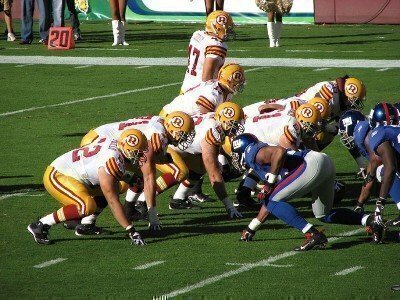A unanimous Supreme Court said on Monday that the federal government’s power to ban all trademark protections for names it deems to be offensive violates the Constitution’s First Amendment.
 The closely watched case of Matal v. Tam (formerly Lee v. Tam) involved an interpretation of the “disparagement clause” in the 1946 Lanham Act, which U.S. Patent and Trademark Office the ability to deny a trademark “disparage . . . or bring . . . into contemp[t] or disrepute any persons, living or dead.”
The closely watched case of Matal v. Tam (formerly Lee v. Tam) involved an interpretation of the “disparagement clause” in the 1946 Lanham Act, which U.S. Patent and Trademark Office the ability to deny a trademark “disparage . . . or bring . . . into contemp[t] or disrepute any persons, living or dead.”
Link: Read The Decision
If the PTO sounds familiar, it is the same office that revoked the trademark for the Washington Redskins football team, which it also considered (at least, the “Redskins” part) as offensive. The Redskins’ case in federal appeals court was put on hold until the Supreme Court ruled in the Tam case.
The Tam case involved a rock band called the Slants, who are based in Portland, Oregon. The band consists of four Asian Americans, and it acknowledges that its name has been used as a racial slur; however, the band also says that its name follows a “long tradition of ‘reappropriation" in order to reclaim racial slurs and take away their power.
The band's application to trademark its name was denied by the PTO in 2011. The Trademark Office can deny any trademark that alludes to “immoral deceptive, or scandalous matter; or matter which way disparage or falsely suggest a connection with persons, living or dead, institutions, beliefs or national symbols, or bring them unto contempt, or disrepute.”
The Slants took their fight to court, and in December 2015, the U.S. Court of Appeals for the Federal Circuit ruled that the band’s name was “private speech and therefore protected by the First Amendment” and that part of the Lanham Act was invalid under the First Amendment. The Trademark Office appealed the decision to the Supreme Court.
On Monday, Justice Samuel Alito in the main opinion in the case sided with the band. “The disparagement clause violates the First Amendment’s Free Speech Clause. Contrary to the Government’s contention, trademarks are private, not government speech,” Alito said.
“Holding that the registration of a trademark converts the mark into government speech would constitute a huge and dangerous extension of the government-speech doctrine, for other systems of government registration (such as copyright) could easily be characterized in the same way,” Alito concluded.
In a concurring opinion, Justice Anthony Kennedy said the disparagement clause “constitutes viewpoint discrimination—a form of speech suppression so potent that it must be subject to rigorous constitutional scrutiny. The Government’s action and the statute on which it is based cannot survive this scrutiny.”
In January’s arguments, many of the Court’s eight Justices wondered why the band’s name wasn’t protected by the First Amendment, when it came to trademark use.
Justice Kennedy seemed to question that concept that no offensive trademarks could be banned by the Trademark Office. At the end of arguments, Justice Samuel Alito questioned an argument made by the government that offensive trademarks could be regulated if they offended a foreign government.
“An awful lot of things are copyrighted in this country that are deeply offensive to some foreign countries, and yet, the FBI enforces the copyright laws,” Alito said.
Scott Bomboy is editor in chief of the National Constitution Center.







